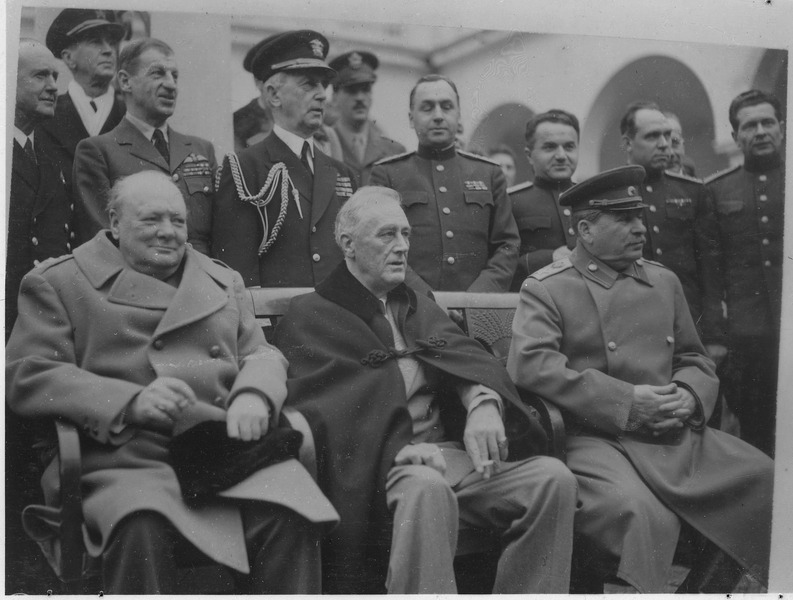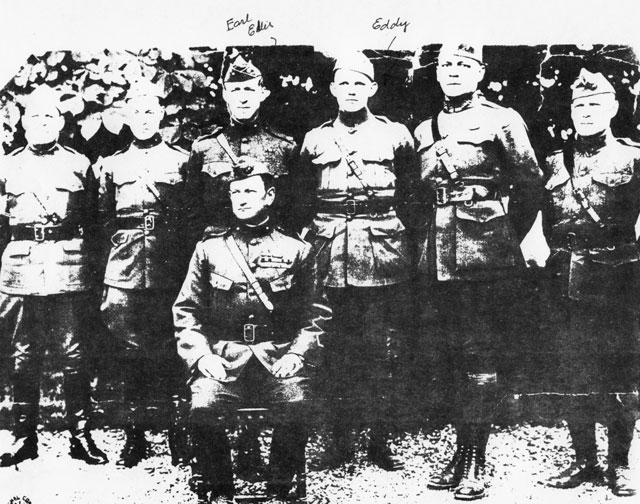(前編を読む)
姿を見せながら潜む
[toggle]Hiding in Plain Sight[/toggle]歴史家は、米国の戦略と外交政策における宗教の重要性について、ようやく合意を持つようになった。それでは、宗教はどのように米国の政治家に影響を与えることができたのか。型どおりの答えとしては3通りあるが、サットンはそこに独特な「ひねり」を加えている。
[toggle]Historians have only just come to terms with the importance of religion to US strategy and foreign policy. How can religion have an influence on American statesmen at all? The conventional answer is threefold, but Sutton adds his own twist. [/toggle]
英国のチャーチル、米国のルーズベルト、ソ連のスターリン
一つ目の答えは、外交史や軍事史における多くの重要人物が神への信仰を最重要視したという点だ。例を言えば、「4つの自由」や「バチカン市国との非公式同盟」などに見られるように、ルーズベルトは第二次世界大戦を「宗教闘争」という構造で捉えた。それは、この戦争が「信仰を基盤とした自由民主主義」と「無神論を基盤としたファシスト独裁者」の闘いという見方だ。ルーズベルトをはじめ多くの政策立案者にとって戦争とは、宗教が生き残るための闘いだった。多くの人々はジョージ・W・ブッシュが米国史上最も信仰的な大統領だと言うが、それには十分な理由がある。しかし、ルーズベルトの信仰深さはブッシュにも引けを取らず、それは彼が戦中に取った戦略にも見ることができる。
[toggle]First is the centrality of faith to many key figures in diplomatic and military history. From the four freedoms to an unofficial alliance with the Vatican, for example, FDR framed World War II as a religious struggle—a war between liberal democracy founded on religious faith and fascist tyranny rooted in godlessness. Indeed, for FDR and many other policymakers, the war was fought for the survival of religion itself. People think of George W. Bush as the most spiritual president in American history, and there are good reasons for doing so. But FDR would rank up there with him, and his faith was often reflected in wartime strategy. [/toggle]第二の答えは、当時の米国は現在と同じように、非常に宗教的な国であり、社会のあらゆる層にさまざまな宗教の信者がいた点だ。米国の政治と文化を形成する大きな要素は、憲法修正第1条の「政教分離」によって守られている多宗教主義なのだ(現代では多くの人が勘違いしているが、政教分離とは「教会が国家から干渉を受けないこと」であり、その逆ではない)。宗教的な人々は社会活動に活発であることが多く、彼ら彼女らを精神的に支えたのは、宗教の唱える理想だった。教会やシナゴーグでは、高い理想を持つ人々によるネットワークが形成されていたが、その多くは、個人であれグループであれ、ホワイトハウスや議会とのつながりを持つ人々であり、外交政策の専門家となる人々が学ぶ各大学とのつながりがある人々だった。彼ら彼女らは、政府の外交政策について意見があれば、その声を政府に届けようと努めた。そして、その声は無視できるものではなかった。
[toggle]Second, the United States was a highly religious country then, just as it is today, and a variety of religions found adherents in every stratum of society. Religious pluralism, safeguarded by the First Amendment’s separation of church and state (which insulated the church from state interference and not just the other way around, as is commonly assumed today), did much to shape American politics and culture. Religious people were more likely to participate in civil society, and they were highly motivated by their ideals. Churches and synagogues provided existing networks of highly idealistic and motivated people, many of whom—either individually or as a group—had ties to the White House, Congress, and universities from which foreign policy experts often came. If they felt the government could be doing something better in terms of foreign policy, they made sure their views were known. And they could not be ignored. [/toggle]3つ目の答えは、宗教的な米国人の政治的活動には、国境を越える道徳性があったという点だ。彼ら彼女らは、自らを米国市民としてだけではなく、国境を越えた「信仰共同体の一人」として捉えていた。また彼らの世界観は、駆け引きによって成り立つものではない。これが、宗教に関わらない米国人ビジネスマンが持つ広い分野での関わり方との決定的な違いだ。言い換えるなら、宗教的な米国人は、単に物資を取り引きするのではなく、世界中の道徳的基準、社会のつながり方を変えようとしたのだ。それは世界をより良い場所にするための努力であり、その願いの基盤となったのは宗教的価値観だった。
[toggle]Third, this political activism mattered because religious Americans were driven by moral concerns that transcended national borders—they saw themselves as members of transnational faith communities, not just as citizens of the United States. Moreover, their worldview was not transactional; this was a crucial difference from how other, non-religious Americans, such as businessmen, engaged the wider world. In other words, religious Americans wanted to change social relations along moral lines around the world, not simply participate in the commercial exchange of material goods. They wanted to make the world a better place, and their religious values shaped those efforts. [/toggle]ここでサットンは4つ目の理由をつけ加える。それは同書でも取り扱われているが、これまであまり評価されてこなかったものだ。私たちが米国の戦争や外交政策、政治などに宗教が及ぼす影響を調査するとき、その作業には行間を読むことが求められることが多い。結局のところ、政治家や国家安全保障の担当者は、(当人が敬虔な信者であっても)基本的には国政について宗教用語を使って発言したり、公式文書で宗教的な言い回しをしたりすることはないからだ。しかしサットンは、必ずしも経験に基づいた推測を行う必要はないと言う。
[toggle]But there’s actually a fourth reason, not really appreciated until now, provided by Sutton and explored in Double Crossed. Those of us who have researched the religious influence on American war, foreign policy, and politics have often felt compelled to read between the lines. After all, politicians and national security officials—even those who are personally devout—don’t usually couch their statecraft in religious terms or use religious language in official documents. But Sutton shows that we don’t always have to make educated guesses: [/toggle]多くの場合、証拠というのは、姿を見せながら潜んでいるものだ。サットンが過去の記録を徹底的に掘り下げた結果を見れば、宗教と国政との間には、反論の余地がないほどの深いつながりが見えてくる。彼の著作の主人公たちは、宣教師としての経験を使って非常に有能な諜報員となった。そして多くの場合、彼らはその諜報活動を、信仰から生まれる活動の一環としても捉えていた。サットンはこれらのことを、推論によってではなく、政府機関や教会で見つけた膨大な記録から導き出せることを実証した。彼の働きはまさに先駆的なものだ。
[toggle]Often the evidence is hiding in plain sight. His exhaustive digging in the archives reveals a deep and irrefutable connection between religion and statecraft. His central characters drew on their experience as missionaries to act as highly effective intelligence operatives, and they often framed their intelligence operations in terms of religious faith. Sutton is able to demonstrate this not by inference but by direct reference to a huge amount of evidence from records he found in government agencies as well as churches. His work is truly pathbreaking. [/toggle]変わりゆく風景
[toggle]Changing Landscape[/toggle]サットンはまた、第二次世界大戦のあとで米国の宗教模様がいかに変わったかを意図せず思い出させてくれる。同書は興味をそそる有益な本だが、これはそもそも歴史書なのだ。
[toggle]Sutton also inadvertently reminds us how much the American religious landscape has changed since World War II. Double Crossed is a riveting, informative book, but it is mainly a work of history. [/toggle]
ウィリアム・エディ
エディは良い例だ。彼はもともとリベラルな主流派クリスチャンだったが、今日の基準ではむしろ中道的福音派として定義されるだろう。彼は聖書絶対主義者ではなかったが、サットン曰(いわ)く、「エディは米国の脱宗教化が進み過ぎたせいで、学生たちが聖書を理解せず、キリスト教的信仰を持たないようになった」と考えた。これは実に悲惨だ。というのも、聖書を理解することは、過去と現在を理解する上で必要不可欠だからだ。聖性と世俗性のバランスの取れた教育の場を提供するために、彼はニューヨーク州北部にあるホバート・アンド・ウィリアム・スミス・カレッジで「責任ある市民とは」という講座(4年間)を開いた。「すべてのクリスチャンは、職種にかかわらず、みな宣教師だとエディは考えていた」とサットンは語る。
[toggle]Eddy is a good example: He was a liberal mainline Protestant, but by today’s standards he would come close to being defined as a centrist evangelical. He was no biblical literalist, but he believed, writes Sutton, “that the United States was becoming too secular and that students were losing their understanding of the Bible and the Christian faith.” This could be catastrophic, for knowing the Bible was “essential” to understanding the past and present. To ensure the continuation of a balanced education—of the sacred as well as the secular—he initiated a four-year course in “responsible citizenship” at Hobart and William Smith Colleges in upstate New York. “In Eddy’s mind,” observes Sutton, “all Christians were missionaries regardless of their jobs.”エディの時代では、キリスト教は国家の基盤を支えるものだった。それは今では他からも提供されているものだ。キリスト教は依然としてアメリカン・ライフの多くを占める存在だが、多様な他宗教から無宗教層まで、他の勢力とも共存する必要がある。
[toggle]In Eddy’s day, Christianity provided the nation’s common ground. Now it comes from other sources too. Christianity remains a dominant force in American life, but it has to share space with other forces, from greater religious pluralism to secularization. [/toggle]宗教は社会を一致させるだけではなく、分裂させる力も持っているからだ。ユダヤ・キリスト教の伝統は、第二次世界大戦時には「アメリカ的自由」と「ナチスの専制政治」を区別させる存在として認知された。しかし1960年代以降、ユダヤ・キリスト教の伝統は、宗教と世俗化の対立の高まりに押しのけられてしまった。
[toggle]This means religion has the power to divide society as well as unite it. The Judeo-Christian tradition was first identified in the World War II era as a way to distinguish American freedom from Nazi tyranny. But since the 1960s, the Judeo-Christian tradition has given way to rising conflict between religion and secularism. [/toggle]福音派のクリスチャンは、このように人々が分かれてしまうことを嘆くかもしれないが、後戻りは難しい。その点においても、すべての信仰者を「自由民主主義を保護する使命を受けたパートナー」と見なすエディの言葉は示唆に富んだものだ。他の宣教師スパイたちと同様、エディは「宗教的寛容さ」と「異教徒間の協力」を重要視していた。トーチ作戦(連合軍の北アフリカ侵攻)に備えるため、彼は米国の飛行機からばらまくパンフレットを企画した。「見よ! 我々、米国の聖なる戦士たちが到着した! 我々は自由の聖戦(ジハード)のために来た! あなたがたを自由にするために来たのだ!」とあるが、それはイスラム教からの解放ではなく、ファシズムとナチズムからの解放だ。
[toggle]Evangelicals might lament this polarization of the public square, but they cannot easily reverse it. Eddy, particularly in his drive to see all faiths as partners in the same mission to protect liberal democracy, is instructive here too. Like his fellow missionary spies, he believed in the importance of religious tolerance and interfaith cooperation. To prepare for Operation Torch, the Allied invasion of North Africa, he drafted a pamphlet to be dropped from US planes: “Behold! We the American Holy Warriors have arrived! We have come here to fight the great Jihad of freedom! We have come to set you free!” Not from Islam, but from fascism and Nazism. [/toggle]宗教はしばしば、米国の外交政策における道徳的大義を担ってきたし、それが変えられるべきものだとは限らない。良い例で言えば、1998年に制定された「国際的な宗教の自由法」は、ベトナムのすべての宗教的少数派の権利を擁護するなどの機能を果たしている。
[toggle]Religion has often provided the moral core for US foreign policy, and there is no reason to think this should change. At its best—for example, advocating for the rights of all religious minorities in Vietnam—the 1998 International Religious Freedom Act performs this function today. [/toggle]国家安全保障の主要課題の多くがイスラム教関連とは言え、現代米国は多くの面で世俗化している。一方で、この道徳的大義の役割はより複雑な問題になっている。人々が米国の外交政策をキリスト教の使命と同一視するならば、うまくはいかないだろう。しかし、「うまくやることが難しい」と言うのは、「不可能だ」という意味ではない。ましてや、「宗教的な米国人が外交政策と道徳的信念を関連づけるのを止めるべきだ」という意味でもない。
[toggle]But in an age when parts of the United States are becoming more secular (while many of the key national security challenges involve the role of Islam), exercising this role has become a more complicated matter. US foreign policy will be less successful if people believe it to be simply conflated with Christian mission. Yet difficult doesn’t mean impossible, and it certainly shouldn’t mean that religious Americans cease trying to align American foreign policy commitments with their moral convictions. [/toggle]サットンの紹介した宣教師スパイたちが、この移りゆく状況を察知し、それに応じて応答したという点に、ある者は気づくだろう。それは、同書が良い歴史書であることの証左だ。この著作は、忘れ去られてしまった重要な過去の一部を拾い上げることで、私たちの「今」を照らし出しているのだ。
[toggle]One gets the sense that Sutton’s missionary spies would come to grips with this changing landscape—and respond accordingly. Double Crossed, then, is history at its best: enlightening our present condition by recovering a vital but forgotten chapter of the past. [/toggle]執筆者のアンドリュー・プレストンはケンブリッジ大学のクレア・カレッジで米国の歴史を教えている。
本記事は「クリスチャニティー・トゥデイ」(米国)より翻訳、転載しました。翻訳にあたって、多少の省略をしています。
